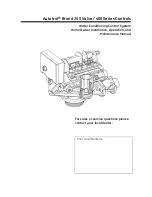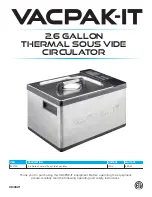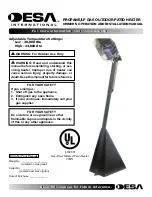
English
Water Supply Connections....
To conserve energy and to prevent freezing, insulate both cold
and hot water supply lines. DO NOT cover the drain valves.
Install a shutoff valve near the inlet of the water heater for service
and draining purposes. Before connecting the water supply pipe to
the water heater, open the shutoff valve ·and clean out sand, debris,
air, caulking material, etc. inside the pipe. Connect to the water
inlet, then check water flow. Close the shutoff valve and clean the
water filter.
If a water heater is installed in a closed water supply system, such as
one having a backflow preventer in the cold water supply line, means
shall be provided to control thermal expansion. Contact the water
supplier or local plumbing inspector on how to control this situation.
CAUTION: This water heater must only be used with the following water supply system conditions:
• With clean, potable water free of corrosive chemicals, sand, dirt, or other contaminates.
• With inlet water temperatures above 32°F, but not to exceed 90°F.
• Free of lime and scale deposits.
•
DO NOT
reverse the hot and cold water connections. The water heater will not operate.
To ensure proper operation of the water heater, the following water pressure guidelines should
be followed:
•
Operation of the water heater requires the minimum water pressure of 14 psi and a minimum flow
rate of 0.8 gpm to activate and 0.7 gpm to maintain water heater activation.
•
Additional water pressure is required for long pipe runs and outlet fitting(s) if water pressure drops.
•
To maintain proper performance, ensure sufficient water supply pressure. The Required Water
Pressure = Min. Operating Water Pressure (14 psi) + Pipe Pressure Loss + Faucet and Shower
Pressure Loss + Safety Margin (more than 5 psi).
•
To supply hot water to upper floors, additional water pressure (0.44 psi/ft) must be ensured. The
measurement should be calculated by the distance between the water inlet of the water heater
(ground level) to the hot water faucet (upper floor level).
• Well water systems should be set at a range of 50-60 psi.
• When the water is supplied from a water supply tank, the height of the tank and the diameter of
the pipes and their relation to water pressure, should be taken into consideration. Gravity water
pressure is not recommended.
IMPORTANT: Do not apply heat to the HOT or COLD water connections. Any heat applied to the
water supply fittings will permanently damage the internal components of the water heater.
NOTICE:
If the water flow resistance of a shower head is too high, the burner in the water heater will
fail to ignite. Keep the shower head clean from debris that could cause additional pressure drop.
Notice:
If using mixing valves on the outlet, choose one which prevents cold water pressure from
overcoming hot water line pressure.
DO NOT
use pipes with smaller diameters than the water supply connection of the water heater.
Be sure to connect the water inlet and the hot water outlet as shown on the water heater. If reversed,
the water heater will not function.
Installation of unions or flexible copper connections are recommended on the HOT and COLD water
lines, so that the water heater may disconnect easily for servicing if necessary.
Plumbing should be carried out by a qualified plumber in accordance with local codes. Use approved
plumbing materials and tools only.
Install a Check Valve between the water heater and the water shutoff valve. (See illustration below).
20HI Installation
















































